Key takeaways:
- Criticism can be a catalyst for personal and creative growth, helping artists refine their craft and explore new avenues.
- Building resilience involves embracing vulnerability, reflecting on one’s artistic identity, and finding strength in community support.
- Viewing criticism as an opportunity for improvement rather than a setback fosters a healthier mindset and encourages artistic evolution.
- Confidence emerges from facing criticism head-on, recognizing personal growth, and embracing the journey of self-acceptance as an artist.
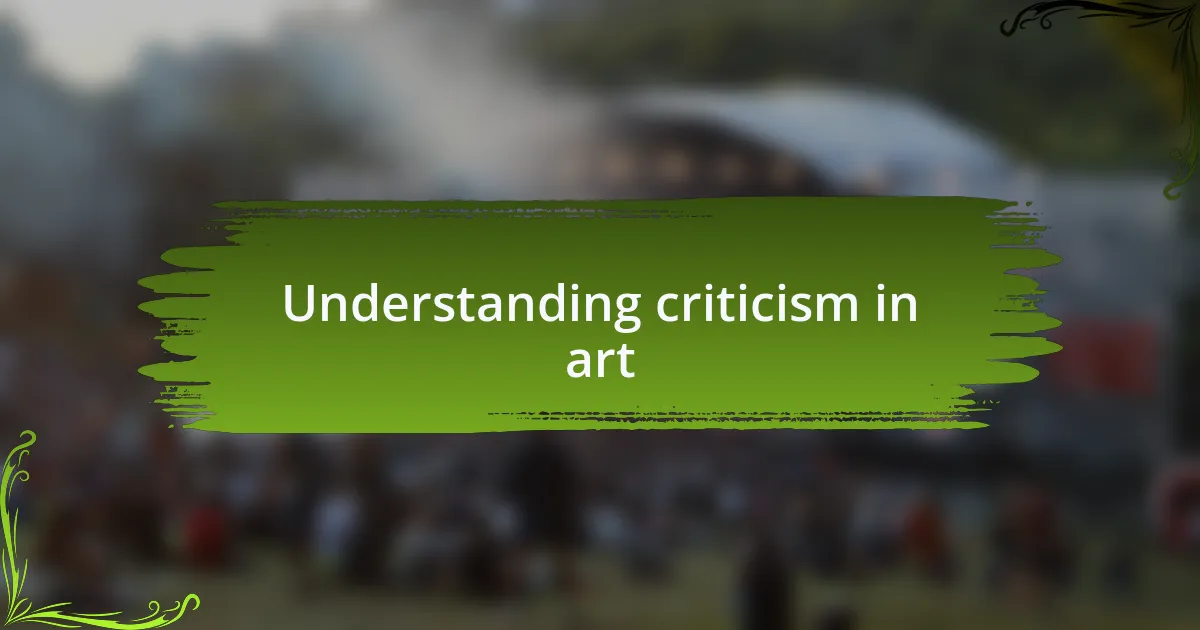
Understanding criticism in art
Criticism in art can feel like a sharp knife, carving out pieces of your confidence. I remember my first public performance where I faced a biting review; it stung deeply. But in hindsight, it became a catalyst for growth, pushing me to refine my craft.
Often, I ask myself: why does criticism hurt so much? It’s not just words; it’s a reflection of vulnerability laid bare. As artists, we invest part of our soul into our work, making any negative feedback feel personal, as though they’re challenging who we are at our core.
Understanding criticism means recognizing its dual nature. On one hand, it can feel like an unwelcome storm, but on the other, it can clear the air, allowing new ideas to flourish. I learned to sift through the harsh comments, looking for the constructive elements; it’s like treasure hunting amidst the rubble.
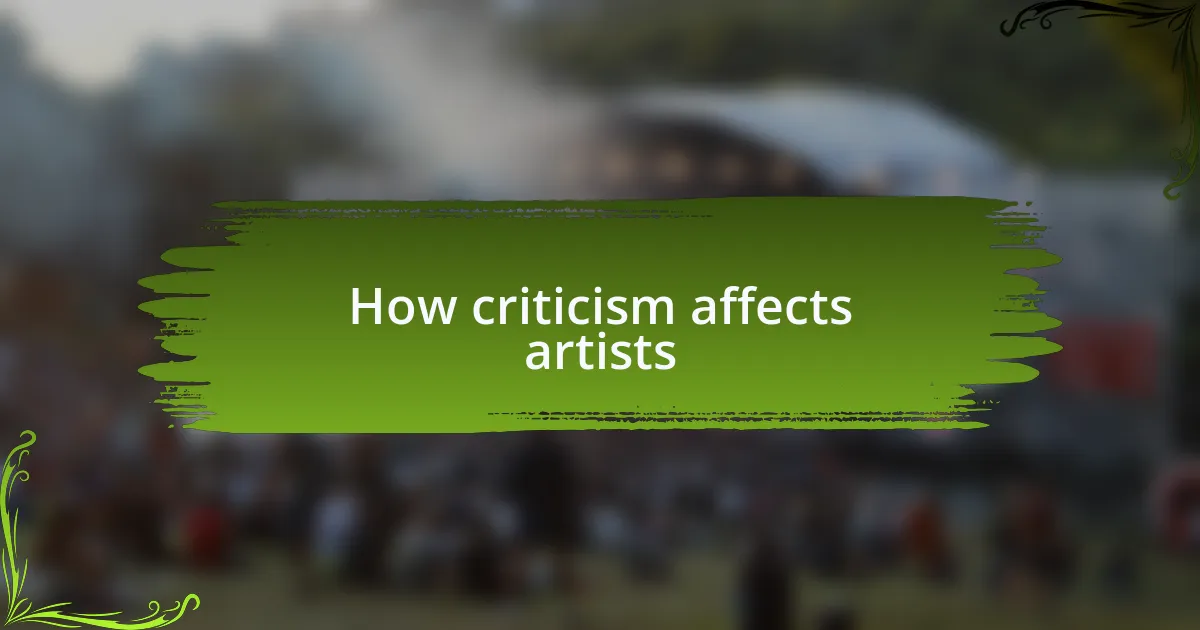
How criticism affects artists
Feedback can strike a sensitive chord with artists. I vividly remember sitting in a café, reading a critique that tore apart one of my songs. At that moment, it felt as if someone had unwrapped all my insecurities and laid them out for the world to see. It’s a sobering reminder that when you share your art, you share a piece of yourself, and that open vulnerability can be both terrifying and liberating.
But how does this criticism really affect our creativity? It can be a double-edged sword. For me, those harsh words eventually spurred a creative rebirth. They didn’t just point out flaws; they forced me to reevaluate direction, leading me to explore new sounds and lyrical themes I might never have considered. It was a challenging but transformative experience, shifting my perspective on feedback entirely.
Criticism, in essence, can ignite a fire or extinguish it. I’ve seen fellow artists shrink under negative reviews, while others thrive and transform. It makes me reflect: why do some crumble while others build? This cycle of creation and destruction is part of the artistic journey, reminding us that growth often emerges from the depths of our struggles.
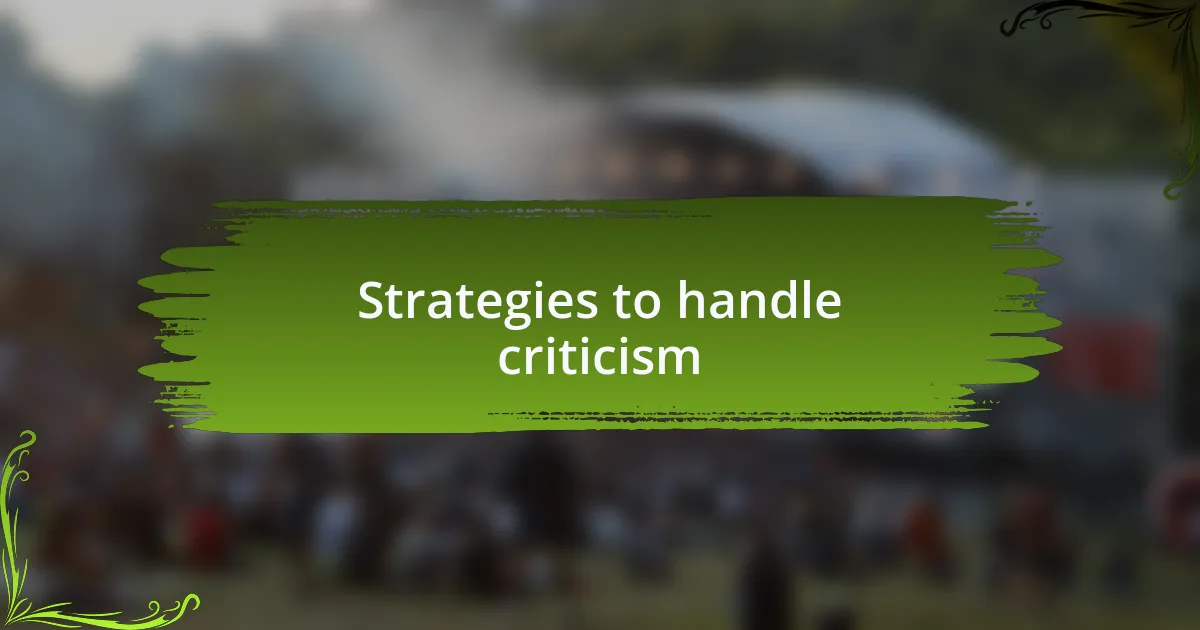
Strategies to handle criticism
To effectively handle criticism, I’ve found that developing a thick skin is crucial. When I first received a harsh review, my instinct was to retaliate or sulk. Instead, I learned to view responses as opportunities for growth. This shift in mindset transformed the emotional sting into a constructive dialogue. Have you ever noticed how a tough critique can spotlight areas for improvement?
Another strategy is to seek out trusted feedback from peers. I remember sharing my music with a close circle of fellow artists before releasing it to the public. Their insights were invaluable, often helping me to see aspects of my work that I missed. By surrounding myself with supportive voices, I created a buffer against the harsher criticisms that sometimes come from strangers. It’s like having a safety net that allows for more daring artistic choices.
Lastly, I often remind myself to keep the bigger picture in mind. Criticism is just one small piece of a much larger puzzle. Reflecting on my journey, it’s clear that every artist faces bumps along the way. When I think back on the songs that have resonated deeply with audiences, I realize they were born from moments where I allowed vulnerability to coexist with bravery. How about you? Have you found ways to let criticism propel you forward rather than hold you back?
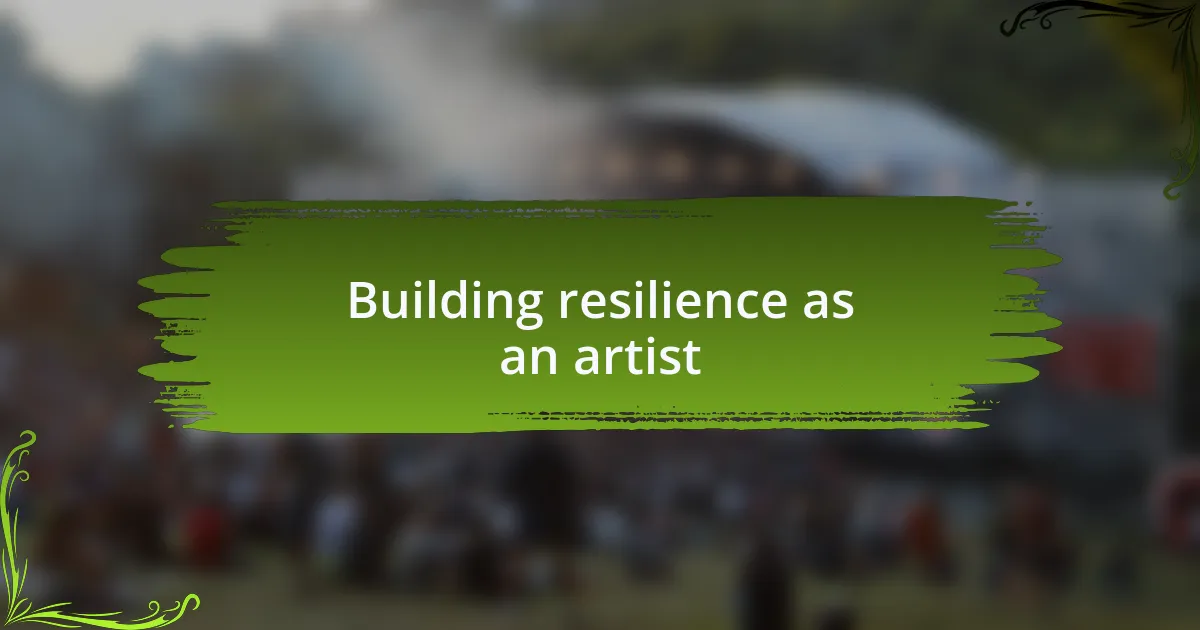
Building resilience as an artist
Building resilience as an artist often comes from embracing the journey rather than fixating on the setbacks. I recall a performance where I felt every note fall flat, and the silence from the audience was deafening. In that moment, I learned that each experience, especially the uncomfortable ones, adds to my growth. When faced with challenges, do I let them break me, or do I choose to rise stronger?
Another way I’ve built resilience is through reflecting on my artistic identity. There was a time when I tried to fit into what I thought was the mold of success in music. But as I embraced my unique style and let go of the fear of rejection, I created music that truly resonated with me. I’ve discovered that authenticity not only fortifies my creativity but also acts as a shield against the negativity; it’s hard to shake someone who knows their worth.
Additionally, I find strength in community. During my early days, I often attended local open mic nights where artists shared their ups and downs. Hearing their stories of struggle and triumph reminded me that resilience is not a solo endeavor. Instead, it’s a tapestry woven from shared experiences. Can you think of a time when a sense of community helped you stand tall in the face of adversity?
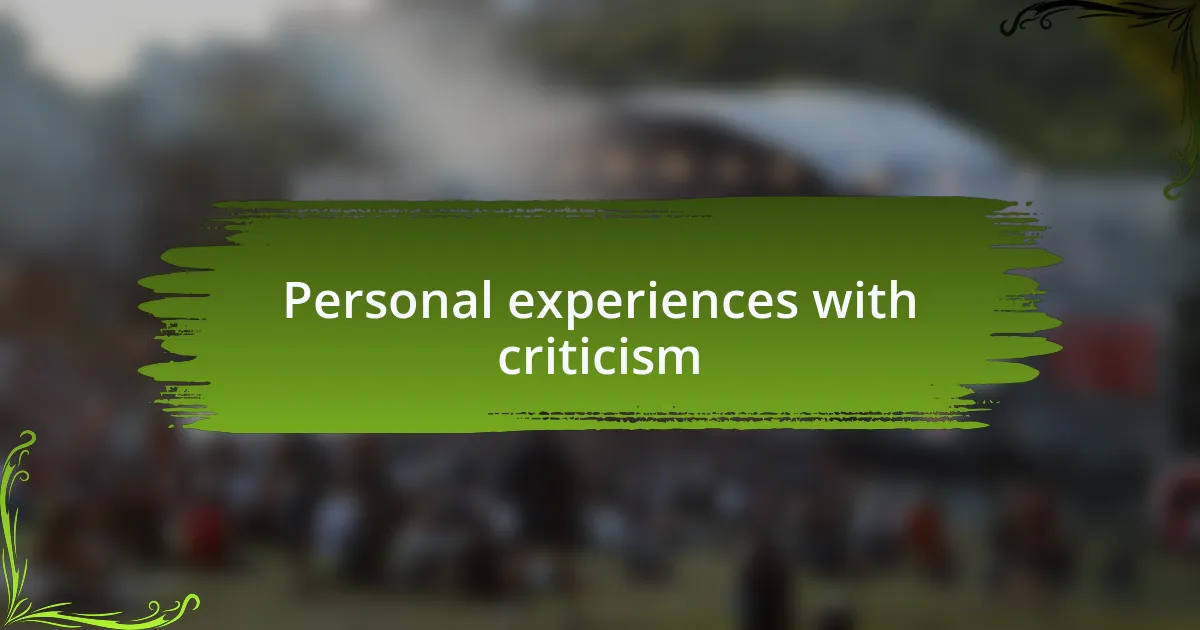
Personal experiences with criticism
I remember my early days as a musician when every critique felt like a personal attack. After a particularly harsh review of one of my songs, I found myself spiraling into self-doubt. It was a tough pill to swallow, but I soon realized that even the best artists face criticism. Instead of retreating, I chose to view the feedback as an opportunity for growth. How can criticism shape an artist if it’s embraced rather than feared?
There was a poignant moment after a tough gig where the feedback was mixed, and I felt disheartened. One supportive audience member approached me afterward, sharing how my performance deeply resonated with them despite the naysayers. That interaction taught me a vital lesson: not everyone will appreciate my work, but reaching even one person was validation enough to keep going. This experience made me reflect on the balance between accepting constructive criticism and recognizing my artistic worth.
Through the years, I encountered criticism that stung differently. There was a time a fellow musician dismissed my song as “not commercial enough.” Initially, I was crushed, questioning my choices. But that moment spurred me to dive deeper into my songwriting, ultimately leading to a project that felt authentic. Isn’t it fascinating how sometimes the harshest words can fuel our passion rather than extinguish it?
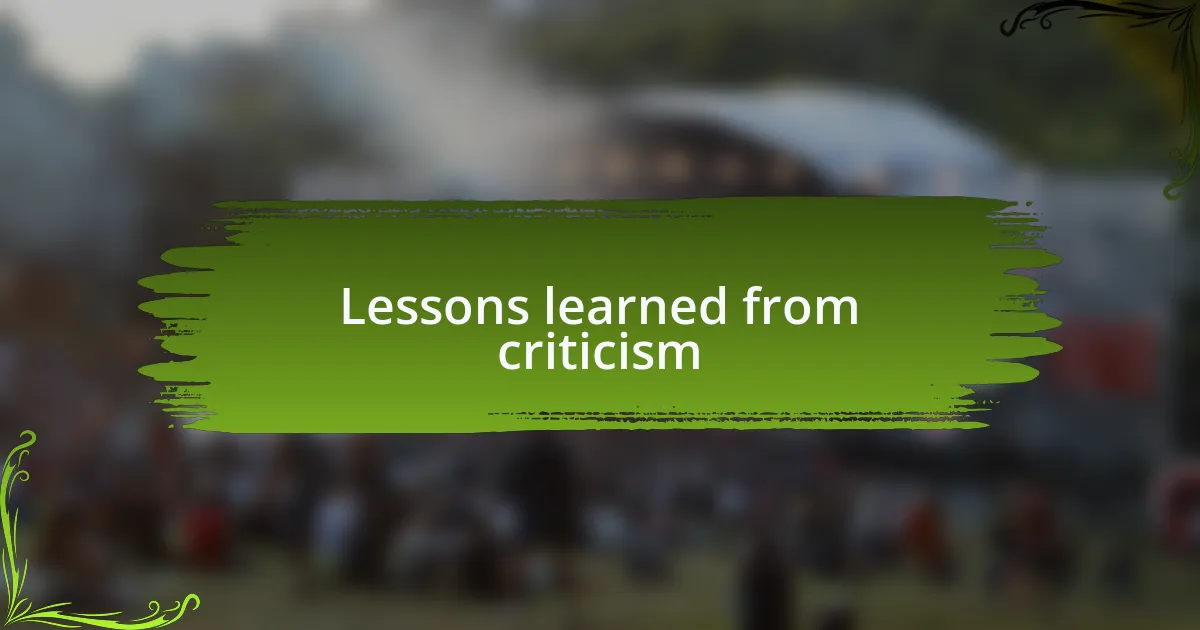
Lessons learned from criticism
Criticism can act as a mirror, reflecting not just our art but our emotional investment in it. I recall receiving feedback that made me question my entire approach to music. Instead of viewing it as a setback, I started to see this as an opportunity to reassess my creative process. What could I learn from the perspectives of others? This shift in mindset allowed me to embrace constructive feedback rather than defend my work.
I’ve also learned that the strongest critiques often come from those who care deeply about the art form, fostering growth if approached positively. During a songwriting workshop, a participant pointed out a recurring theme in my lyrics that felt overused. Initially, I felt defensive, but later, I realized they were nudging me toward deeper self-reflection. Each critique became a stepping stone, leading to breakthroughs that I wouldn’t have pursued otherwise.
Over time, I’ve understood that criticism, while painful, can reveal hidden strengths and areas for exploration. I vividly remember the first time a critic praised my vocal range but critiqued my stage presence. This was a pivotal moment for me, sparking a journey that led me to refine not just my performances, but how I communicated with my audience. Isn’t it intriguing how a single observation can ignite a transformative journey in our artistic expression?
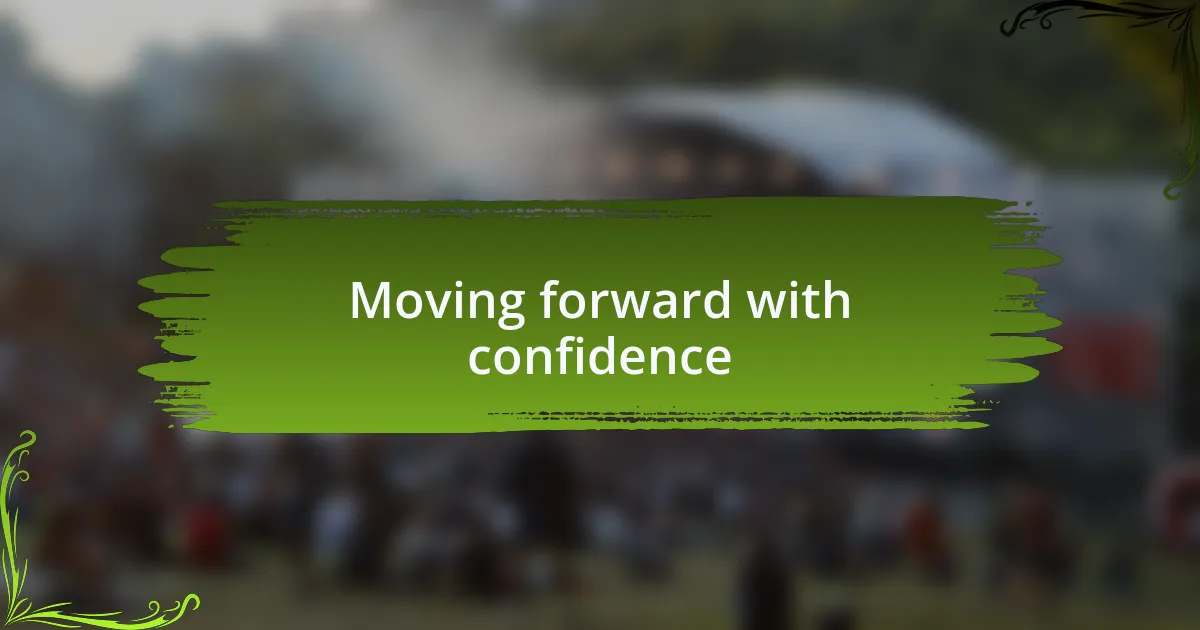
Moving forward with confidence
I remember the moment I took a big step towards confidence: performing in front of a crowd that had been critical of my music in the past. Instead of feeling intimidated, I framed that experience as an opportunity to prove to myself what I was capable of. Standing on that stage, I felt a surge of empowerment, knowing that every note I played was not just about them accepting me, but about my acceptance of my own craft. How liberating it is to transform fear into motivation!
Building confidence isn’t just about the applause; it’s also about recognizing my growth. For instance, after receiving feedback on a track I poured my soul into, I realized that every reaction, whether positive or negative, provided a chance to evolve. It’s almost like standing at a crossroads—every direction guided by the voices of those who listen to my music. How can feedback not only refine my sound but also shape my identity as an artist?
The path to confidence requires often confronting my inner critic. One memorable evening, I shared a song that I felt particularly vulnerable about, fully expecting the worst. When the feedback was overwhelmingly positive, it pushed the boundaries of my self-doubt, almost inviting me to step more boldly into my artistry. Isn’t it curious how facing that fear head-on can transform vulnerability into strength and clarity in my music?